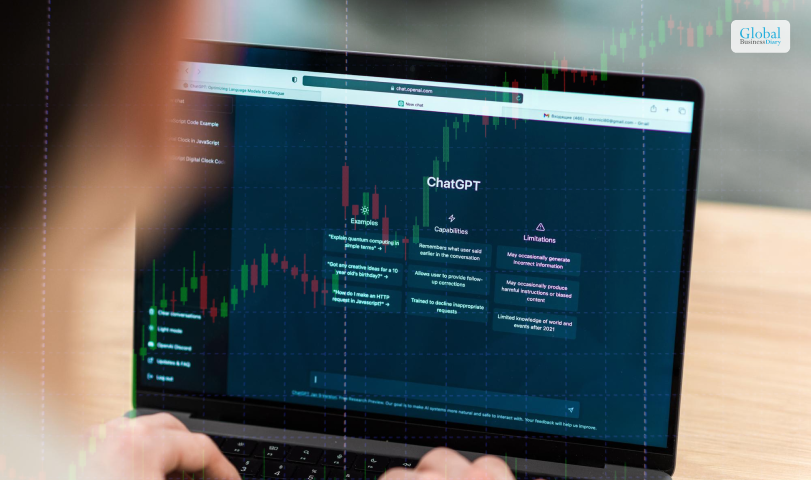How To Invest in ChatGPT?

Generative AI is the new big thing in technology. There is rarely anyone in the US who doesn’t use ChatGPT daily in miscellaneous ways. Let’s find out how to invest in chat gpt?
It is a viral Generative AI tool from OpenAI. Elon Musk and Sam Altman started the firm together.
Altman’s disruptive NLP tool, GPT 3.5, is the basis of ChatGPT.
We won’t brood over its uses and revolutionary benefits. Let’s focus more on its unquestionable effect on the economics of the AI sector.
If you are searching for information on how to invest in chat gpt, you may have also heard rumors about the ChatGPT IPO.
ChatGPT’s Exponential Growth

After getting a $1 billion investment from Microsoft, it is no surprise that ChapGPT may file for an IPO soon.
ChatGPT has the sponsorship of Microsoft. Elon Musk is one of its patrons, too.
At the same time, ChatGPT is already an integral part of the AI circuits.
Most big tech giants are looping ChatGPT’s language processing and ML tools in order to improve their services.
Here’s a roundabout opportunity for you if you’re considering investing in chat get.
All these suggest that ChatGPT’s exponential growth will carry on. Also, hoping their IPO will be released soon won’t be an exaggeration.
Now you know how you can benefit from investing in ChatGPT.
Understanding ChatGPT Stock

Most of us know that ChatGPT is a private company. You will not find ChatGPT stocks in any publicly traded market. So, why is there a buzz regarding ChatGPT stock?
Why do most people also search? How do you invest in chatgpt?
Description Of ChatGPT Stock and Its Status as a Private Company
According to market data from May 2023, ChatGPT is not publicly listed yet. You won’t find ChatGPT or its parent platform, OpenAI, on any market.
Currently, there are no public equities in the market linked with ChatGPT.
Explanation Of the Lack of Public Trading Options for ChatGPT Stock
OpenAI does not trade publicly in any market. There is only one rumor about ChatGPT’s IPO. However, Altman said they have no plans to go public anytime soon.
Therefore, there are no real chances of ChatGPT going public as well.
So, let’s not waste time searching how to invest in chat gpt.
Investing Strategies

There are no public stocks of ChatGPT. But can you invest in chat gpt?
Well, I would say YES! Maybe.
1. Investing Indirectly
There are alternative strategies for investing in ChatGPT. Let’s discuss the directs stocks and the ETFs linked to ChatGPT.
If you’re thinking about investing in chat gpt, there’s no direct way to do so.
Investing in companies closely associated with ChatGPT, such as Microsoft
Can you invest in chatgpt through Microsoft? Yes.
Why is it valid to say so?
Since 2019, we have seen a strategic partnership between Microsoft and OpenAI.
There were rounds of investment from Microsoft in the development of their winning product, ChatGPT.
In 2023, ChatGPT landed. We also saw a prompt $10 billion investment from Microsoft.
The swathe of investment proves that Microsoft believes in the product’s potential.
So, when ChatGPT profits, the ROI earned by Microsoft will also return better dividends for its investors.
Now you have the answer to your top internet search- how to invest in chat gpt.
Highlighting the Benefits of Investing in Microsoft for Exposure to ChatGPT
For other reasons, investing in Microsoft’s stocks can be equivalent to investing in ChatGPT.
Microsoft Azure, Copilot, and the latest AI assistant rely heavily on ChatGPT’s technology.
After integrating OpenAI in Microsoft’s services, 65% of the Fortune 500 companies use those now.
But how can you invest in chatgpt, if Microsoft thrives?
They can leverage their strategic partnership with ChatGPT if you invest more in Microsoft.
Both brands can lock in a win-win scenario. If Microsoft profits by linking ChatGPT, it will share dividends with investors. At the same time, you can win big-time, if ChatGPT grows, too.
Consequentially, ChatGPT will invest more in its service quality. As a result, the service linked with Microsoft will improve, too.
It means higher customer satisfaction and better revenue returns for Microsoft.
2. Exploring AI Stocks
Most AI companies are exposed to ChatGPT or its indirect benefits.
So, you can freely invest in any of these AI stocks. Anyway, your investment will leverage ChatGPT’s potential to grow.
Listing Other AI Companies Like NVIDIA, C3.ai, Alphabet Inc, and IBM for Potential Investment Opportunities
- NVIDIA
ChatGPT marked a journey of exponential growth for the AI platforms. However, NVidia emerged around 1 year after that. However, NVidia has exhibited a Y-o-Y growth of 262.1% since then.
They manufacture processing chips. Most AI tools process data and create output through these chips.
So, most companies will need NVidia’s chips to run ChatGPT’s modules.
Understandably, ChatGPT can benefit from this circular model. Investors can, therefore, invest in ChatGPT indirectly by investing in NVDA.
NVidia is currently in the category of appreciation stocks with a per-share value of 1,064.69 USD.
So, most companies will need NVidia’s chips to run ChatGPT’s modules.
Maybe you won’t get this info if you search how to invest in chat gpt. But read this blog clearly, as it answers your question.
- C3.ai
It is a rising platform for enterprise AI. Their AI service is dedicated to businesses going digital, all out.
The firm also helps you to take your business to the Cloud. They can also help you with seamless cloud connectivity. At the same time, they will create a non-complicated cloud UI for your business with AI.
However, C3.ai also uses ChatGPT’s NLP tools. So, you can invest in ChatGPT indirectly by investing in C3.ai.
- Alphabet Inc
ChatGPT can study Gemini AI’s growth and functionality to improve. Gemini, as we all know, belongs to Google. Alphabet is Google’s parent firm.
Most importantly, ChatGPT can learn from the traits of two of the leading technologies used in Alphabet’s AI:
- The Pathways Language Model
- Common Crawl Collection
- IBM
IBM’s stock also saw rapid growth recently.
IBM gave a dividend of 3.89% to all investors. Presently, their stock is valued at $170.89. Moreover, the stock price is up by +0.22.
Discussing the Potential Growth of these AI Stocks Due to Advancements in Natural Language Processing
All the tech companies run service requests from human commands. Above all, you need NLP to run human commands better. The language processing technology allows the software to understand the command better.
So, NLP plays a significant role in customer satisfaction. At the same time, customer satisfaction is linked with better revenue and revenue –returns, too.
3. Considering Tech Companies
Many tech companies rely on ChatGPT to improve their services. To invest in chatgpt, you may also invest in mid to low cap stocks like Upstart.
I still see many people enquiring- can i invest in chat gpt?
But the only alternative to investing in ChatGPT’s direct stock is to put your money into other emerging tech stocks.
Exploring Tech Companies Like Upstart and Perion Network That May Benefit from The Expansion of ChatGPT Technology
Let’s check out the potential and linkage of these two emerging companies with ChatGPT.
- Upstart
Brands like Mercedes patronize Upstart’s AI solutions. As a result, experts think their stock value will shoot up very soon. Currently, Upstart is trading at 23.35 USD, with 0.19% growth already.
- Perion
Perion is a low cap advertising technology business. They also use ChatGPT’s module for understanding as well as processing the publisher’s request.
Discussing The Correlation Between Tech Company Performance and The Adoption of AI Solutions
ChatGPT is new and still emerging. They activated monetizing recently. I was also wondering- can i invest in chat gpt, given the risk factors.
However, the linked growth of other tech companies can leverage ChatGPT’s growth potential.
Risks and Caution

Can you buy stock in chat gpt? No.
So, how to invest in chat gpt?
Through exposed tech stocks, as I discussed.
You can certainly buy other publicly traded tech stocks. But are they free of risks?
I’d say the risk is permanent.
Highlighting The High-risk Nature of Investing in Emerging Technologies Like ChatGPT
I still see persistent searches like Can you buy stock in chat gpt. I don’t feel they are aware of the risks of investing in emerging technologies like AI.
According to me, the change in regulatory decisions can disrupt the growth of ChatGPT’s stock overnight.
Competitors of ChatGPT can also overturn the market with Liam2 or similar progressive technology.
Discussing The Importance of Thorough Research and Due Diligence Before Making Investment Decisions
Chat gpt invest readily into disruptive technology. But how can i invest in chat gpt in a risk-free way?
Certainly.
I must do detailed fundamental research on the balance sheets, new investments, strategic partnerships, and existing liabilities of ChatGPT in the market.
Conclusion
How do i invest in chat gpt?
It seems that there are no direct means of investing in ChatGPT now. The company does not trade directly in the market.
So, its not worthwhile to search how to invest in chat gpt. Rather, search other tech stocks where you can invest.
So, we must consider the alternative means of investing in chat gpt. For instance, we can invest in the tech stocks related to ChatGPT. We may also invest in ETFs exposed to ChatGPT.
If you want to know what ChatGPT ETFs are, please read the blog “Best Artificial Intelligence (AI) Stocks to Invest in US.” ChatGPT-related stocks can be volatile, too. Most of the stocks are also at their appreciation stages. At the same time, they might have reached market saturation, too. So, evaluate their current position before investing.
For The Best Articles Click Below!!













